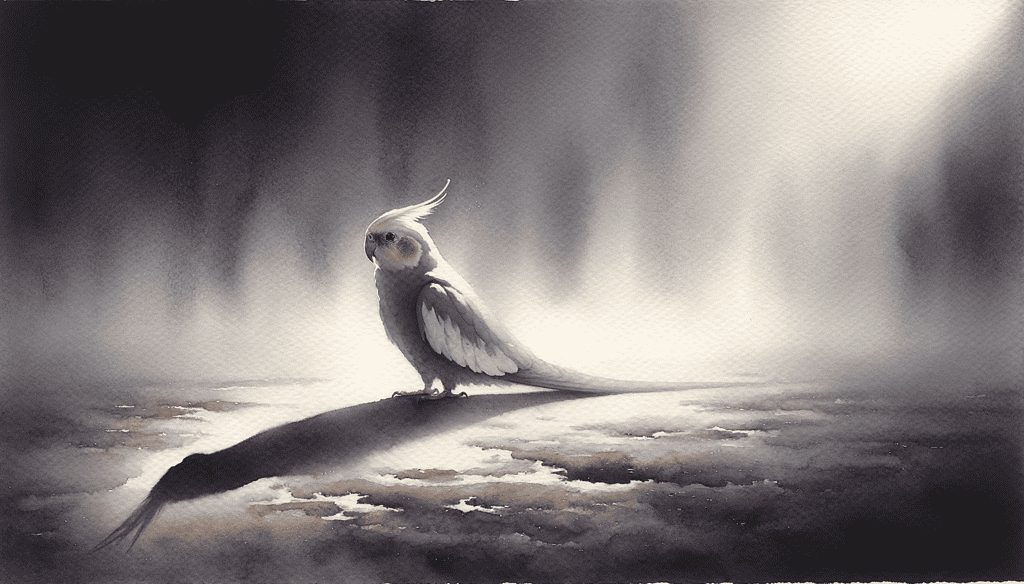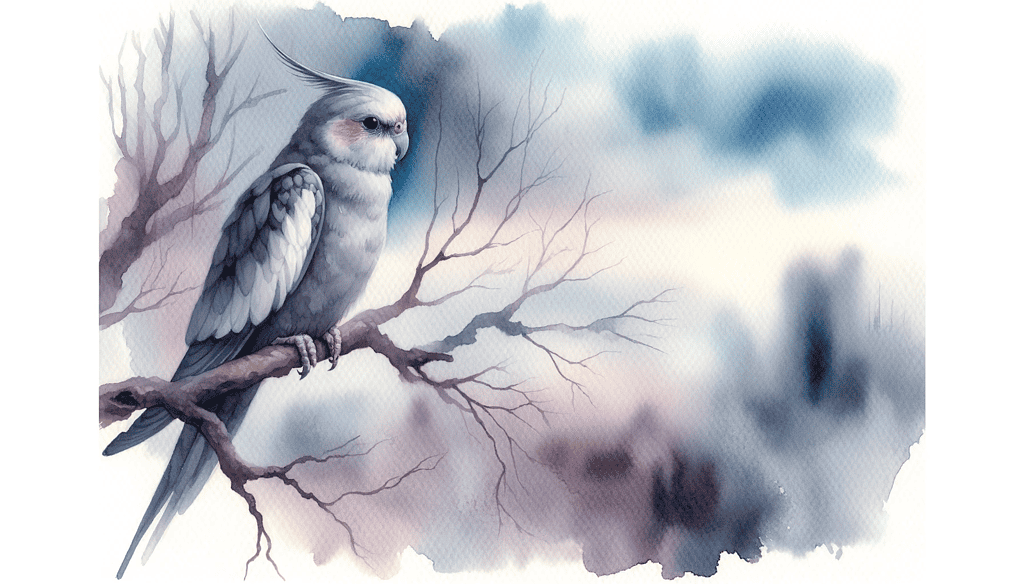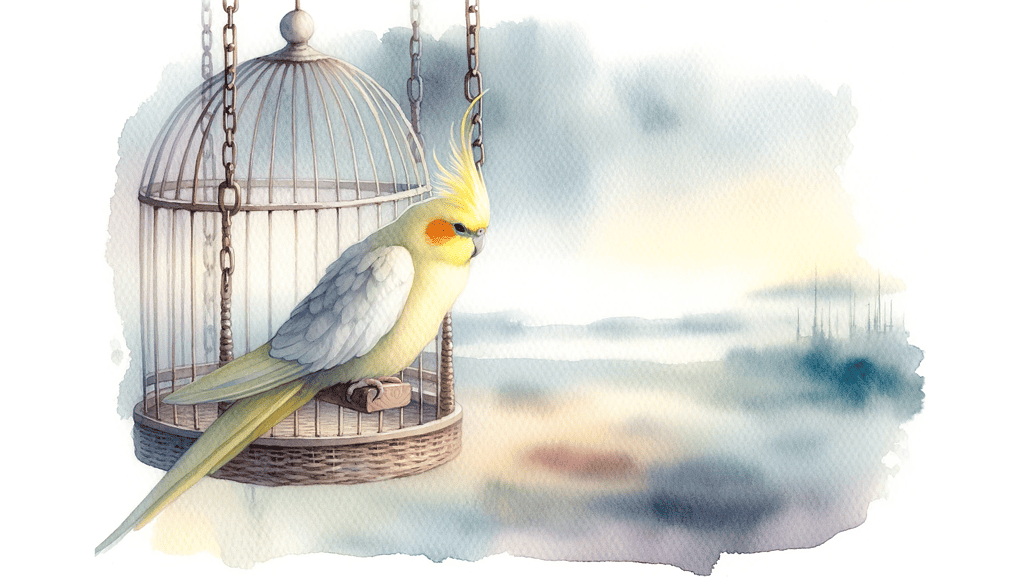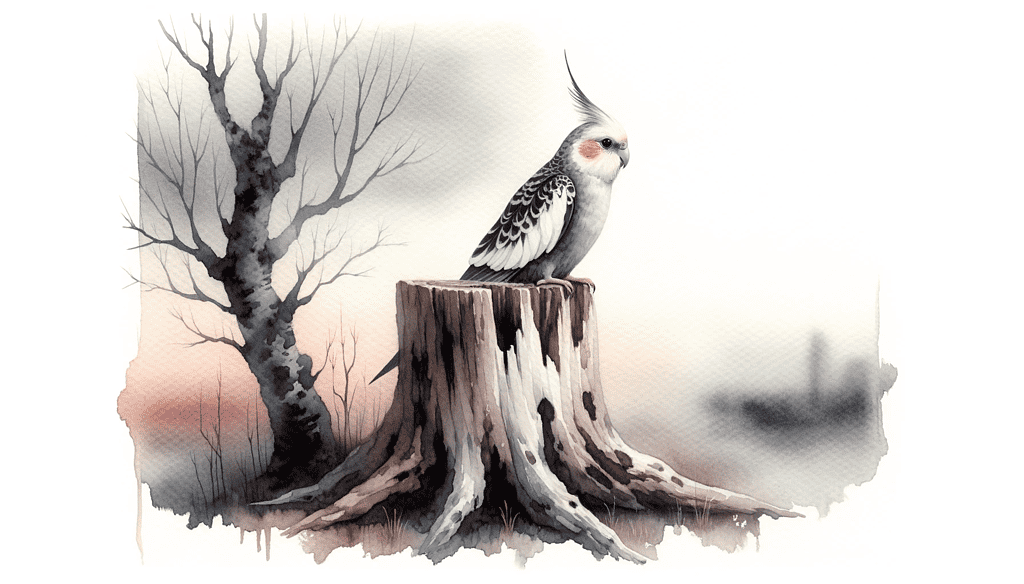
The intricate emotions and well-being of our feathered companions often slip under the radar, yet they hold immense significance in their lives. Particularly for cockatiels, a species known for their vibrant personalities and strong social bonds, loneliness can become a silent but pressing concern. As a devoted pet owner, you’re rightly seeking guidance on this matter.
As a general rule, cockatiels, like many other birds, are innately social creatures that thrive on interaction and companionship. Prolonged isolation or lack of stimulating activities can lead to symptoms of loneliness, which may manifest as behavioral changes, health issues, or even depression.
Dive deeper with us as we unravel the causes, signs, and most importantly, effective interventions to combat loneliness in these charming avians, ensuring their mental and emotional well-being.
Can Cockatiels Live Alone
Cockatiels can indeed live alone, if they are provided by ample attention, interaction, and mental stimulation from their human companions. A single cockatiel can thrive if it’s included in various activities and receives the level of social interaction that it requires to stay mentally and emotionally healthy.
- It’s crucial to keep them engaged and provide them with a stimulating environment to prevent feelings of loneliness or boredom.
- However, having more than one cockatiel or providing a companion bird could be beneficial for their well-being, as it mirrors their natural living conditions more closely.
It’s also a means to ensure they have company and interaction during times when human companionship might be lacking.
Do Cockatiels Get Lonely?
Absolutely. Just like us humans, cockatiels are social creatures. In the wild, they’re rarely seen alone, often traveling in flocks and forging strong bonds with their fellow birds. Their social nature doesn’t change when they’re kept as pets; in fact, the absence of a flock can amplify their need for companionship.
- A too-quiet cockatiel might be a sign of distress. As someone who has spent considerable time with these birds, I can tell you that a cockatiel that has become unusually quiet often indicates depression or even illness. It’s essential to pay attention to these subtle signs and act swiftly.
- Loneliness isn’t just an emotional challenge for cockatiels; it can have real, tangible health implications. A lonely bird is more prone to stress, and prolonged stress can lead to a weakened immune system, making them susceptible to diseases.
Can Cockatiels Die Due to Loneliness?

Cockatiels are social birds and can become stressed or depressed if left alone for extended periods, especially if they have been accustomed to regular interaction either with humans or other birds. However, they will not die solely from loneliness, although extreme stress or depression could potentially exacerbate other health issues, which might lead to a decline in their health over time.
It’s noteworthy that the probability of a cockatiel dying from loneliness is considered to be extremely low, but certain circumstances might increase the risk, such as a bird being already sick or mourning the loss of a partner without much support.
Signs of Loneliness in Cockatiels

Cockatiels, like many of us, crave companionship, so it becomes crucial to identify the signs that suggest they might be feeling lonely. Over the years, I’ve identified several behavioral changes that might indicate a cockatiel’s emotional distress. Let’s walk through them.
- Lack of Activity: A lonely cockatiel might spend most of its day sitting idly. Unlike their usual lively selves, where they would hop around, play with toys, or engage in some form of activity, a lonely bird will seem almost listless.
- Feather Plucking: One of the most evident signs of distress in cockatiels is when they start pulling out their own feathers. There could be various reasons for feather plucking, loneliness is a significant contributor.
- Vocalization: While cockatiels are naturally vocal birds, a lonely one might vocalize excessively. This could be their way of calling out for attention or expressing their distress. If you notice your bird making more noise than usual or changing its tone suddenly, it’s time to pay attention.
- Decreased Appetite: Just as some of us might lose our appetite when we’re upset, cockatiels can show a similar response. A lonely cockatiel might start eating less or show disinterest in their favorite treats. This can be concerning as a lack of proper nutrition can lead to other health issues.
- Aggression: A typically friendly and sociable cockatiel becoming aggressive is a red flag. They might become nippy or defensive, especially when you try to approach them or their cage. This could be their way of communicating their unhappiness.
The Impact of Loneliness on Cockatiels
Over the years, I’ve treated numerous cockatiels, and a recurring theme has emerged: loneliness can drastically impact their overall health and well-being. Let’s dive into the specifics.
- Emotional Distress: Cockatiels can become sad and lethargic when isolated for long periods.
- Destructive Behaviors: Depression can lead to actions like feather plucking.
- Weakened Immunity: Elevated stress from loneliness can compromise their immune system, making them prone to diseases.
- Malnutrition: Loneliness can reduce appetite, leading to nutritional deficiencies.
- Physical Decline: Reduced activity can result in muscle tone loss and overall physical weakness.
- Severe Health Risks: Prolonged neglect can lead to organ complications and a cascade of health issues.
The Benefits of Having More Than One Cockatiel
Having two cockatiels offers numerous advantages.
- Companionship: Cockatiels provide each other with essential companionship, reducing feelings of loneliness.
- Health and Grooming: Mutual grooming is not just a bonding activity but also crucial for maintaining feather health and preventing skin issues.
- Male Rivalry Concerns: While two male cockatiels can sometimes have conflicts, it’s not always the case. Compatibility is determined more by individual personalities and the environment than just gender.
- Understanding Personalities: It’s essential to know your birds’ personalities and ensure they have enough space to coexist without feeling threatened.
- Considering a New Addition: Before introducing a new cockatiel, weigh the advantages and disadvantages.
With the right environment and understanding, multiple cockatiels can coexist harmoniously, leading to happier and healthier birds.
How To Address Loneliness in Cockatiels

Addressing the loneliness in cockatiels isn’t just about providing company. It’s about ensuring their environment is enriched, engaging, and mentally stimulating. With a combination of personal interaction and environmental enrichment, you can ensure your cockatiel remains vibrant and joyful, just as they ought to be.
Here are some practical steps you can take
- Bonding with Your Cockatiel: Establishing a personal bond is paramount. Dedicate time each day to interact with your cockatiel. Simple activities like talking, singing, or even reading aloud can make them feel connected. It’s not just about combating loneliness but also ensuring their minds remain stimulated.
- Introducing a Companion from a Different Bird Species: Diversity can be delightful! Sometimes, introducing a bird of a different species can do wonders. It can be intriguing for a cockatiel to interact with another bird type, provided they are compatible in terms of temperament and size.
- Outdoor Exposure: While cockatiels are indoor birds, occasional exposure to the outdoors can be rejuvenating. A secured aviary or even a supervised time on a balcony allows them to experience the fresh air and diverse sounds of the outside world. This change in environment can be mentally stimulating for them.
- Auditory Stimulation: Birds are naturally drawn to sounds. Playing the radio or specific bird recordings can offer auditory stimulation. It makes them feel as if they’re in a lively environment, even when they’re alone.
- Allowing Flight and Space: Restricting a bird’s natural instinct to fly can be detrimental. Ensuring your cockatiel has a safe space to fly indoors, even if it’s for a short period daily, can contribute significantly to their physical and mental health.
- Toys and Entertainment: Keeping a cockatiel mentally engaged is vital. A variety of toys, from mirrors to puzzle toys, can keep them occupied. Regularly rotating these toys ensures they don’t get bored of the same ones.
Conclusion
Understanding and addressing loneliness in cockatiels is paramount for ensuring their well-being and longevity. Adequate social interaction, whether it comes from humans or other birds, can significantly enhance the quality of life of these social animals. Keeping cockatiels happy and healthy is a rewarding experience. They are affectionate and engaging companions that bring joy to their owners.
Sharing knowledge and experiences about combating loneliness in cockatiels is essential for fostering a community of well-informed and responsible bird owners. Your insights, experiences, and suggestions on this topic are invaluable. Feel free to share your thoughts in the comments and spread awareness about the importance of social interaction for cockatiels.
Frequently Asked Questions
Can 2 male cockatiels live together?
Yes, it’s possible for two male cockatiels to live together, although it’s not always recommended due to potential aggression, especially if a hierarchy hasn’t been established. It’s best to monitor their behavior closely and be prepared to separate them if necessary.
Can 2 female cockatiels live together?
Yes, female cockatiels can live together and will often keep each other company. They will establish a pecking order, and it’s crucial to ensure their cage is large enough with extra perches and twice as many food and water bowls.
What to do if my cockatiel gets lonely or bored?
To alleviate boredom and loneliness, provide toys for chewing and shredding, offer captive foraging opportunities, and ensure they have a safe place to bathe. Spending more time outside the cage are other methods to keep them entertained and alleviate loneliness.
Is it okay to have just one cockatiel?
It’s okay to have just one cockatiel as long as you can provide them with ample attention, interaction, and entertainment to prevent boredom and loneliness. Without sufficient interaction, a single cockatiel may exhibit aggressive behaviors, become excessively noisy, or experience stress that could lead to health issues.
